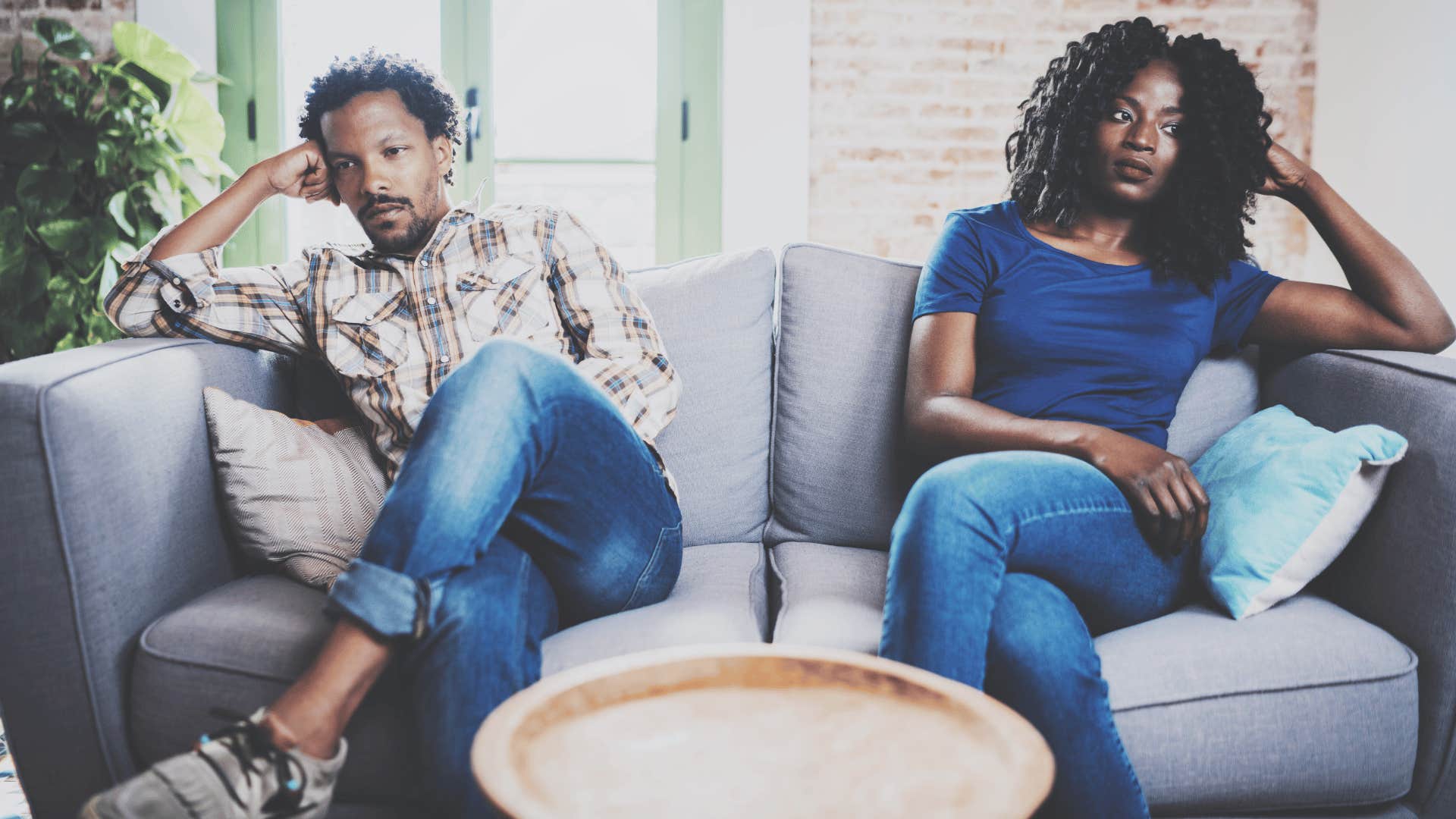10 Phrases Passive-Aggressive People Use Without Even Realizing It
They don't necessarily mean to sound so rude, but that doesn't excuse the behavior.
 Shutterstock / Nicoleta Ionescu
Shutterstock / Nicoleta Ionescu The phrases passive-aggressive people use without even realizing it can cause emotional harm and confusion. Just because someone might be expressing negative emotions in a subconscious way, that doesn’t make their behavior right.
It’s difficult to know how to navigate relationships with passive-aggressive people, as their behavior can feel hostile, even though they communicate in such an indirect way. People might not even realize they’re being passive-aggressive, due to being out-of-touch with their own emotions. Yet their inner sadness, anger, and insecurities spill out when they express those negative feelings in quiet yet cutting ways.
Here are 10 phrases passive-aggressive people use without even realizing it
1. "Whatever you think is right."
 Kmpzzz | Shutterstock
Kmpzzz | Shutterstock
A typical phrase passive aggressive people use without even realizing it is, “Whatever you think is right.”
This phrase captures the kind of subtle displeasure a person might feel when they’re arguing with someone else. Instead of voicing their opinion or sharing what they think is the correct course of action, they use this passive aggressive phrase to get under the other person’s skin.
The phrase is often said as a subtle dig at the other person’s low level of intelligence.
People who say this might seem like they’re trying to avoid a conflict, but really, they’re creating extra tension by not saying what they really mean. By not expressing their beliefs, they practically set the other person up for failure.
2. "I thought it was obvious."
 PeopleImages.com - Yuri A. | Shutterstock
PeopleImages.com - Yuri A. | Shutterstock
Another example of a phrase a passive aggressive person would use without even realizing it is, “I thought it was obvious.” This is an attempt to shift blame by making you think you should have already known how to take care of or known something.
You might work with a colleague who hides behind a facade of politeness, only to reveal how passive aggressive they are by not helping on team projects, then blaming you when the work goes unfinished. They’ll tell you that certain answers were obvious, despite not sharing them with you in the first place.
By using this phrase, passive aggressive people reveal who they really are.
3. "If that makes you happy."
 novak.elcic | Shutterstock
novak.elcic | Shutterstock
In relationships, passive aggressive people often say one thing when they really mean another. One such phrase passive aggressive people often use without even realizing it is. “If that makes you happy.”
This is their way of saying, “I wish you wouldn’t do that,” or “I’m upset with your behavior,” without actually saying so.
Relationship consultant Rhoberta Shaler explains that passive aggressive people don’t communicate in open or direct ways. Instead, they give ambiguous answers that shield what they really think, believe, or want. She notes that gaslighting is another technique passive aggressive people use, saying that, “They don't speak their truth openly, kindly, or honestly.”
4. "I was just trying to help."
 Fotos593 | Shutterstock
Fotos593 | Shutterstock
Another example of a phrase passive aggressive people use without realizing it is, “I was just trying to help.” Using this phrase is a way of framing themselves as the victim in any given conflict.
Passive aggressive people are so accustomed to communicating in indirect ways that they often interpret someone’s boundaries as mean or unappreciative.
They react to pushback by telling people they were only trying to help, which lets them think of themselves in a positive light. They also overstep boundaries while refusing to take accountability for doing so, claiming they were "just trying to help.”
5. "I’m surprised you managed to pull that off."
 fizkes | Shutterstock
fizkes | Shutterstock
Passive-aggressive people will offer compliments that are actually insults in disguise. After their co-worker finishes a high-stakes presentation, for example, they’ll say things like, “I’m surprised you managed to pull that off.”
Statements like this have more to do with their own insecurity than anything else. They might be trying to drag you down, but you don’t have to give them the satisfaction of reacting.
As philosophy professor Brit Brogaard explains, “On some level, they already know what they are doing, and may escalate their bad behavior to get back at you if you bring it up.” She advises against directly confronting someone for being passive aggressive, sharing that taking the high road is the best course of action.
“The most effective approach is to ignore the behavior and pretend you don't notice it,” Brogaard concludes. Passive aggressive people are subtly cruel because they’re trying to get a reaction out of you, so by not giving them the satisfaction of being upset, you’re able to shut them down.
6. "Don’t worry about it."
 Andrey_Popov | Shutterstock
Andrey_Popov | Shutterstock
Passive aggressive people often use the phrase, “Don’t worry about it,” when really, they mean the opposite. It might seem like they’re being laid back and non-confrontational, yet they're being purposefully evasive about their own emotions.
Statements like this function as a set-up, as the person saying it will still feel hurt, especially if their intentions weren’t understood.
Saying, “Don’t worry about it” in the midst of a tense conversation makes the other person doubt their own reality, because it’s usually accompanied by body language that reflects just how much the passive aggressive person does care. They might avoid eye contact, cross their arms over their chest, or have rigid posture - all of which show that they’re angry even though they’re pretending they’re not.
7. "I guess you have better things to do."
 Ground Picture | Shutterstock
Ground Picture | Shutterstock
The phrase “I guess you have better things to do” is a phrase passive aggressive people use without realizing it. This phrase is a form of guilt-tripping behavior, as it’s designed to purposefully make other people feel like they let the other person down, despite the fact that they didn’t directly express what they wanted.
When passive aggressive people say this phrase, their underlying hope is that the other person will change their plans and spend time with them. In some ways, the phrase is a weaponization of emotions, aimed to get someone to do something they don’t actually feel comfortable with.
A common scenario in which this phrase gets used occurs between parents who struggle to stay close to their adult children.The parents might say it to emotionally manipulate their kids into giving them attention, despite not asking for that attention outright.
8. "I’m sure you did your best."
 Dean Drobot | Shutterstock
Dean Drobot | Shutterstock
“I’m sure you did your best” is another phrase passive aggressive people use without realizing it. The phrase is a subtle insult, framed in such a way that it almost seems like a kind, generous comment. When someone says this, they don’t really believe that you did your best work. In fact, they usually think you failed, but they just won’t tell you to your face.
Psychologist Linda Sapadin notes that resorting to passive aggressive comments is “disingenuous” and “relationship-damaging.” She shares that while it isn’t always easy to change the pattern of being passive aggressive, it can be achieved with thoughtful introspection. She explains further that building up your confidence is a major part of becoming less passive aggressive.
“The more confident [you] feel, the more you’ll be able to speak your mind, share your feelings and express your opinions in a comfortable and carefree manner,” Sapadin concludes.
9. "I didn’t know you cared so much."
 Ilona Kozhevnikova | Shutterstock
Ilona Kozhevnikova | Shutterstock
Saying “I didn’t know you cared so much” is a phrase passive aggressive people use without even realizing it.
The roots of passive aggressive behavior run deep, which is why people are often unaware of their own behavior. As Psychology Today notes, most passive aggression comes from anger and frustration that people tamp down in an attempt to avoid feeling the full range of their emotions.
It’s possible that passive aggressive people were taught in childhood that it wasn’t okay to be angry, which resulted in them becoming adults who don’t know how to process difficult feelings or how to emotionally regulate themselves. They don’t have the skill sets they need to express what’s going on inside, so their true feelings come out in hostile yet passive aggressive ways.
While having low emotional intelligence is often a cause of passive aggressive behavior, people still have the capacity to change it. By being self-reflective and giving themselves permission to feel, they can eventually learn how to communicate more effectively.
10. "It’s not important, forget I said anything."
 SFIO CRACHO | Shutterstock
SFIO CRACHO | Shutterstock
Passive aggressive people use the phrase “It’s not important, forget I said anything” in moments when their emotional or practical needs aren’t being met, yet they’re unable to fully express what those needs are. They act dismissive of their own feelings, which is their way of making themselves into a victim to elicit sympathy.
People who are passive aggressive often struggle to know themselves, which leads to them giving off mixed messages. It’s hard to base a close relationship on anything but clear communication, which is why passive aggression is so detrimental to the connection between two people. Dealing with consistent passive aggressive behavior can wear people’s patience down, which is why openly and honestly sharing how you feel is so valuable.
Alexandra Blogier is a writer on YourTango's news and entertainment team. She covers social issues, pop culture analysis and all things to do with the entertainment industry.

